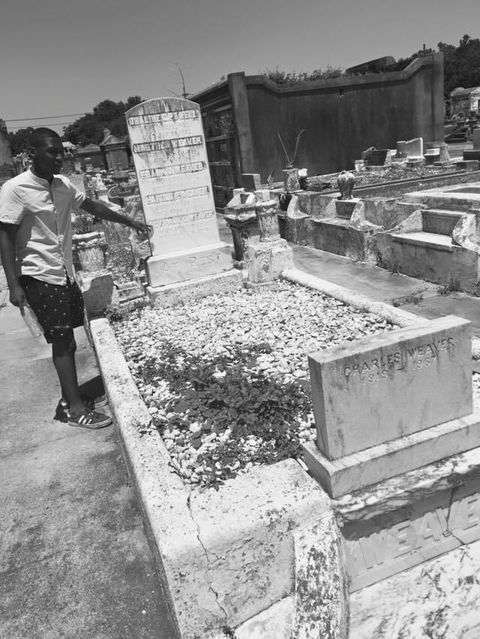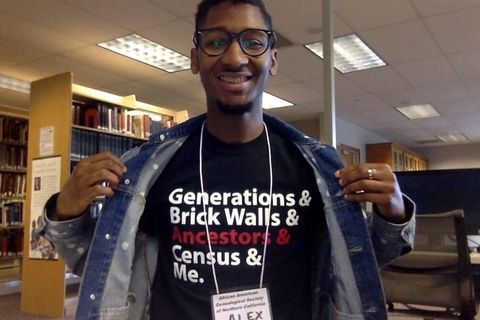Alex Trapps-Chabala is a young genealogist whose main focus is tracing the lineage of African American people.
He grew up between East Sacramento and the Bay Area. But as preteen, his family sent him to live with with relatives in Alabama to get some discipline for an attitude problem. It was that time spent in the south that pushed Alex toward becoming a genealogist.

Alex says that while in Alabama, his grandmother taught him about his family and showed him how to dig through archives and records in order to uncover more information.
As he got more invested in genealogy, he saw gaps in how African American history is told, as well as opportunities to illuminate more Black family histories.
Alex began pulling up vital records, census records and even digitizing records of home births. With the help of others in his field, Alex is compiling a database he hopes will be a resource for African American families.
Now through his startup, The KinConnector, Alex is aiming to have an easy to use database that fills voids in African American histories.
Below are lightly edited excerpts of my conversation with Alex Trapps-Chaballa.
PEN: The work that you do now…What does it look like?
ALEX: So a typical day for me looks like combing through tons of census records and vital records on an individual’s family. And then looking through newspaper reports and obituaries and court cases, whatever is available in order to kind of piece together a family’s history. But then also it involves me combatting systems that would otherwise not want us to have that information… I’ve witnessed records like literally be destroyed in front of my face just because someone’s grandfather was involved in something that may not look good in 2020 standards. So I have to work with these librarians and archivists and convince them that you know that our stories are worthy to be told.
ALEX: This summer, I was able to travel to Louisiana, Alabama and Mississippi. I was basically just going and collecting midwife records from those areas… particularly in Alabama. Those records date back to the late eighteen hundreds. And for black folks, especially in the rural south, were delivered by midwives. But these midwives were the go to healers for the community. They were the doctors, the nurses. They were the registrars of pretty much every family around. And I’ve been basically digitizing all of their records because they recorded information on every single family.
PEN: What do you do in that instance when you run into records of slavery?
ALEX: I interact with records of slavery pretty much every day, but it’s always an emotional experience because you’re seeing them written down as property. You’re seeing them in their names next to cattle and furniture.
ALEX: For each client I give them the option and disclosure that we’re entering into this period of enslavement or anything traumatic in their histories and I give them the option to engage with it… If I mentioned that someone’s ancestor was enslaved, then we’re going to name their enslaver and we’re gonna name them as a willful participant in enslavement and the human cargo or human cattle. But then also explain all of the factors involved. Not just ya know the negative part. I explained how your family survived it.
PEN: On that note of generational impact – 1927 Mississippi River flood. How did that impact Black folks in America?
ALEX: That situation basically began this huge dispersal of Black folks, but also it basically re-enslaved Black folks who were in the area. So Black people were put in basically labor camps and living camps where they were like, ‘if you don’t work and build these levees and, get rid of some of the damage of the flood, you can be shot and killed and nobody will find you or you can be imprisoned’.
ALEX: So because of that, you had many people from Mississippi going up to Chicago because it was, you know, this hub of racial progress, and people dispersing all over the place. In Sacramento, where I was mostly raised, there’s this community called Oak Park. Oak Park is basically little Mississippi of California. So people can trace their ancestry right there to Mississippi after the 1927 flood. So in family history, I always look for that. If I notice a family was in one place in 1920 and another place in 1930. I’m definitely taking that flood into account.
PEN: It’s story, it’s more than just DNA. It’s more than just the science. It’s also like the social aspect of it. You know, it’s like how this person interacted with society and it makes me wonder how your work intertwines with this current conversation around reparations in California?
ALEX: For those of us that are you know descendants of enslavement, we can’t really have a conversation about reparations without knowing the individuals who were involved in our own lineage. So reparations, we can, you know, start with enslavement. But also we need reparations for redlining. We need reparations for gerrymandering. We need reparations for mass incarcerations.
ALEX: So until we can name every part of our family that was a recipient of these traumas, and of this discord, and anti-blackness, then we really can’t directly be able to benefit from reparations.
ALEX: My goal with Kin Connecter is for folks to be able to just push that button and say, oh, no my grandmother was here when this happened and witnessed this. Run me my check or whatever the case is. Imagine the world that’d [laughs] we’d have [laughs].
PEN: Right, Right

Rightnowish is an arts and culture podcast produced at KQED. Listen to it wherever you get your podcasts or click the play button at the top of this page and subscribe to the show on NPR One, Spotify, Apple Podcasts, TuneIn, Stitcher or wherever you get your podcasts.


